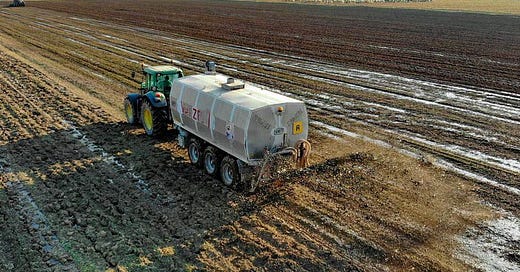Sewage Sludge Fertilizer: Ukraine Conflict Pushes Us to Toxic Food
The Ukrainian conflict enters our food chain: The desperate shortage of industrial fertilizers from Russia and Belarus and extreme energy prices is causing farmers to take a hard look at sewage.
As though Ukraine itself were not enough of a disaster: One unintended side effect of the proxy war is the desperate shortage of industrial fertilizers, dominantly produced by Russia and Belarus but now embargoed, coupled with the extreme high price of natural gas from which fertilizer is also produced in Europe, causing farmers to turn to sewage sludge in a desperate attempt to fertilize crops.
Unfortunately ‘night soil’ is laden with all kinds of toxic heavy metals, pesticides, chemical plant residues, microplastics, drugs, and estrogenic ‘gender benders’ (from birth control for example), none of which are good for human health and flourishing.
This is the dividend being paid to us by the ‘Greta’ crowd who, over the last 40 years, pushed the West towards the retrograde sackcloth-and-ashes approach of ‘renewable energy’ thus only increasing our collective dependence on fossil fuels from Russia. And now, here we are - frankly this stuff should be thrown to the bottom of the Marianas Trench but instead we are increasingly using it at the very base of our food chain - as though we did not already have enough chemicals in our food and water.

By Frank Carini, ecoRI News:
Sewage sludge that many wastewater treatment facilities lightly treat and then sell throughout the United States as home fertilizer contains concerning levels of controversial substances.
Last year the Sierra Club and the Michigan-based Ecology Center found toxic per- and polyfluoroalkyl substances, better known as PFAS or “forever chemicals,” in nine fertilizers made from sewage sludge — commonly called “biosolids” in ingredient lists — and mapped businesses selling sludge-based fertilizers and composts for home use.
Eight of the nine products tested exceeded the screening guideline for perfluorooctanesulfonic acid (PFOS) or perfluorooctanoic acid (PFOA) set in Maine, the state with the strictest safeguards for PFAS levels in sludge spread on agricultural lands. PFOS and PFOA are two of the more dangerous forever chemicals. They are no longer manufactured in the United States, but they are still produced internationally and can be imported in consumer goods.
Overall, there may be as many as 5,000 of these manufactured chemical compounds on the market today. They persist in the environment and in our bloodstreams, as these compounds suffer no degradation in light or air or through biological processes. Since they are highly mobile, their contamination is spreading through soil into ground and surface waters and accumulating in fish, shellfish, wildlife, and crops.
PFAS levels in these home fertilizers and compost raise concerns that the chemicals could be contaminating fruits and vegetables and could be harming those who eat them, according to those behind the 2021 report. Forever chemicals, which have been linked to cancer, thyroid disease and weakened immunity, coat food packaging, fabrics, and waterproof clothing. They are used in electronics, firefighting foam, anti-fogging sprays, waxes, microwave popcorn bags, some pizza boxes, and countless other items. They have seeped into drinking water supplies in both Rhode Island and Massachusetts.
Source: ecori.org
In another article, we see that this is already well on its way to becoming common practice:
As the wastewater from our homes and businesses is treated, a solid material called sewage sludge is formed. Due to it’s organic matter and nutrients, it has become commonly used as a fertiliser. In the UK, around 3.5 million tonnes per year, or 170,000 truckloads, are spread onto agricultural land.
Despite undergoing treatment, treated sewage sludge still contains a number of different contaminants including chemicals and microplastics. Microplastics have been found to accumulate in soils and are washed into waterways, which ultimately lead to the ocean.
Source: MCSUK
I suppose, to add insult to injury, foods labelled ‘organic’ are likely to have been fertilized with literal toxic crap.
- by GITM, 03.05.22




